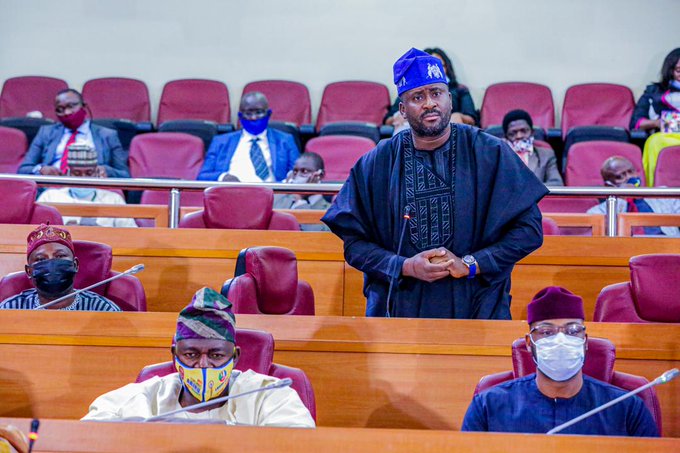Features
Is the Infantilisation of the Nigerian Youth a Deliberate Move by the Government?

One thing a lot of Nigerian youths can relate to is the ‘shut up, what do you know?’ reply that accompanies almost every question we ask or suggestion we bring. Many adults believe that kids are little Jon Snows, busy knowing nothing. There’s always the surprise, shock, contempt, or awe when they meet kids who say and know stuff. This surprise is quickly masked by “shut up, you’re just a little kid and you don’t know what you’re saying” or “someone must have taught you to say this”.
Just like poverty and insecurity, infantilising Nigerian youth by calling them ‘kids’ is a political tool, and in the past few weeks, we have seen Nigerian politicians make use of this tool. Yesterday, Desmond Elliot came under fire for referring to Nigerian youth on social media as ‘children’. But he is not the first to do so. During the #EndSARS protests, Segun Awosanya, popularly known as Segalinks, described the protesters as ‘kids who may be rude and intolerant’. Dino Melaye, during the protests, also called on Buhari, who he described as the father of the nation, to ‘address his children‘. Femi Adesina also described the protesters as keyboard warriors. Yahaya Bello, governor of Kogi state, also claimed that the protest was sponsored by politicians.
When a Lagos lawmaker, Mojisola Alli-Macauley, started her speech at the State House of Assembly, she started with “these children, the youths…” Then she went on to say “they’re high on drugs all the time, they go to social media and do all sorts of things.”
"They (Nigerian youths) are high on drugs all the time, most of them. They go to social media to do all sorts of things." – Lagos lawmaker, Mojisola Alli-Macauley, on recent events in the state. pic.twitter.com/MpAkkFwSXi
— Pulse Nigeria (@PulseNigeria247) October 29, 2020
There’s a pattern to all of this: throw in the words ‘children’, ‘youths’, ‘child’s play’, ”indomie generation’, ‘phone-pressing generation’, and suddenly, everything the Nigerian youth says or does becomes inconsequential. Claiming that the protest was sponsored by political opponents is also a subtle way of passing a message that the average Nigerian youth is a kid who cannot think for him/herself.
While we are here fuming that they are belittling us, we should also observe that this disdain and ridiculing of the youth could be a step in the direction of passing the social media bill and many steps in the direction of clipping our power. Of course, our leaders cannot claim that Nigerian youths are too little – age-wise – to be involved in politics. Many of them planned coups and came into power in their twenties. How old is Desmond Elliot for him to refer to Nigerian youths as children?
What our politicians cannot come to terms with is Nigerian youths having the balls to face them in a society where young ones – children – are meant to cower in the presence of the ‘elders’. They want to be oppressors who cannot be questioned. They want to be looters who cannot be stopped. The audacity of the youth to stand up to them is a major problem. But the medium – social media – through which the Nigerian youth is standing up is an even bigger problem. For them, the clamping down of social media is of utmost importance and a matter of urgency. This, they have started to do by referring to the users of social media – who are mainly youths – as children, drug users, fake news peddlers, instigators of violence, people who want to usurp the government – all these just to discredit the intelligence of the youths and their use of social media.
"There's a way this social media can be controlled. You can't just post anything in the United Arab Emirates, for instance. It's being controlled by the government." – Lagos lawmaker, Wahab Jimoh. pic.twitter.com/kLfqYQPFR8
— Pulse Nigeria (@PulseNigeria247) October 29, 2020
"We can also regulate our social media. We cannot allow our social media to plunge us into war." Lagos lawmaker, Ganiyu Sanni. pic.twitter.com/4RldsEW9mR
— Pulse Nigeria (@PulseNigeria247) October 29, 2020
Deputy Speaker of Lagos House of Assembly, Wasiu Sanni, says social media influencers made the shooting of peaceful #EndSARS protesters in Lekki worse than it was.
"They aggravated and catalysed the destruction of Lagos." pic.twitter.com/FeEHawky0g
— Pulse Nigeria (@PulseNigeria247) October 29, 2020
Where do we go from here?
Nigerian politicians need to realise that Nigerians are not their children and they are not our fathers/mothers. Let’s kill this narrative. No politician is doing us a favour by doing their jobs. As long as you are being paid by taxpayers, you have a responsibility to the people – not as your ‘children’, but as citizens of a country who have the power to hold you accountable when you F up. It is absurd that in the midst of this economic wreckage, inflation, insecurity, poor healthcare, terrible transportation, little or no electricity, our leaders are more concerned about respect and culture.
The citizens you are referring to as ‘these children’ are youths who can tell when a country is working or not. I haven’t had power supply in a full week. Last week, I was almost robbed in traffic where I was stuck for over 3 hours. I can’t be assured of proper healthcare in Nigeria. The public schools in my area are nothing to write home about. The roads are extremely terrible. As a youth, I know when a country is working, and when I come on social media to call out our elected leaders and air my grievances, respect is the last thing on my mind.
Demanding respect at a time when many Nigerian youths are frustrated, dismissing their outrage by calling them rude children, and trying to paint them in a bad light by calling them drug addicts or fake news peddlers is a new level of insensitivity unlocked by our leaders. I can’t help but think that this is deliberate.
Nigerian leaders need to put an end to this ‘shut up culture’. You can’t demand respect when you’re clearly underperforming. “Let’s put an end to this social media before it destroys us all” is a way of saying “let’s shut these children up before they expose all our secrets.” All these ‘talks’ might just be funny or irritating at the moment, but it is obvious they are taking steps to clamp down on social media and shut us up. We have to come up with strategies on how to ensure this does not happen.
1. They are mandated by law to conduct public hearings. Attend these hearings.
2. Before the hearing, read the draft bill, note misgivings & grey areas. Seek clarification where necessary
3. If passed, §ions infringe on fundamental rights to free speech, approach the courts https://t.co/IBy3q6Ne2l
— Ife Adebayo (@IfeAdebayo) October 30, 2020
Anyway, if we ever get to that stage when the internet is blocked in Nigeria, here are things we can do.






















